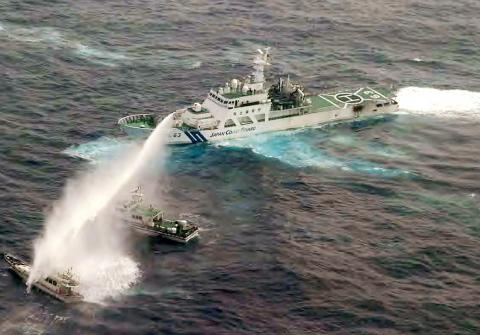A new report from the Congressional Research Service (CRS) raises a potentially difficult question for Taipei about its current relationship with Beijing.
“One issue for US policy concerns trends across the Taiwan Strait since 2008,” says the report, made public on Monday.
The report asks whether Taiwan’s moves to grow closer to the People’s Republic of China (PRC) have “created a greater willingness” in Taipei to cooperate with Beijing on issues “in which it sees their interests as aligned.”

Photo: AFP
In particular, the new report — entitled Maritime Territorial Disputes in East Asia — suggests that the US Congress should examine Taiwan-China cooperation in the East China Sea.
“Some analysts argue that there is an issue for US policymakers surrounding whether Taiwan coordinated with the PRC in asserting sovereignty of the Senkaku Islands [Diaoyutai Islands (釣魚台)] against Japan amid rising tension in September 2012,” the report says.
Written by specialist in Asian security affairs Shirley Kan and specialists in Asian affairs Ben Dolven and Mark Manyin, the report is likely to get special attention from the House Committee on Foreign Affairs and the Senate Committee on Foreign Relations.
The report says China has urged cooperation over the islands to advance cross-strait ties, but, to date, Taipei officials have denied cooperating with Beijing.
“Even without explicit coordination, the parallel actions of the PRC and Taiwan in the current East China Sea flareup have added pressure against Japan,” the report says.
It says that both China and Taiwan have deployed government patrol ships and military assets that have “raised concerns about the potential for accidental collisions and the escalation of tensions.”
On Sept. 25 last year, Taiwan deployed 12 coast guard ships that escorted 60 fishing boats and fired water cannons at Japan’s patrol ships.
“Furthermore, Taiwan dispatched military systems sold by the United States during the incident,” the report says.
The US Congress will face many questions arising from maritime territorial disputes in East Asia, the report adds.
The sovereignty disputes themselves are so difficult and raise such wide-ranging issues for US policy that managing them will touch on congressional oversight of US President Barack Obama’s diplomatic actions in Asia, it says.
The report says that Congress will have to consider the Obama administration’s military posture and budgets, and “its search for ways to limit the potential for conflict and create a more stable environment in the region.”

PREPAREDNESS: Given the difficulty of importing ammunition during wartime, the Ministry of National Defense said it would prioritize ‘coproduction’ partnerships A newly formed unit of the Marine Corps tasked with land-based security operations has recently replaced its aging, domestically produced rifles with more advanced, US-made M4A1 rifles, a source said yesterday. The unnamed source familiar with the matter said the First Security Battalion of the Marine Corps’ Air Defense and Base Guard Group has replaced its older T65K2 rifles, which have been in service since the late 1980s, with the newly received M4A1s. The source did not say exactly when the upgrade took place or how many M4A1s were issued to the battalion. The confirmation came after Chinese-language media reported

A Ministry of Foreign Affairs official yesterday said that a delegation that visited China for an APEC meeting did not receive any kind of treatment that downgraded Taiwan’s sovereignty. Department of International Organizations Director-General Jonathan Sun (孫儉元) said that he and a group of ministry officials visited Shenzhen, China, to attend the APEC Informal Senior Officials’ Meeting last month. The trip went “smoothly and safely” for all Taiwanese delegates, as the Chinese side arranged the trip in accordance with long-standing practices, Sun said at the ministry’s weekly briefing. The Taiwanese group did not encounter any political suppression, he said. Sun made the remarks when

The Taiwanese passport ranked 33rd in a global listing of passports by convenience this month, rising three places from last month’s ranking, but matching its position in January last year. The Henley Passport Index, an international ranking of passports by the number of designations its holder can travel to without a visa, showed that the Taiwan passport enables holders to travel to 139 countries and territories without a visa. Singapore’s passport was ranked the most powerful with visa-free access to 192 destinations out of 227, according to the index published on Tuesday by UK-based migration investment consultancy firm Henley and Partners. Japan’s and

BROAD AGREEMENT: The two are nearing a trade deal to reduce Taiwan’s tariff to 15% and a commitment for TSMC to build five more fabs, a ‘New York Times’ report said Taiwan and the US have reached a broad consensus on a trade deal, the Executive Yuan’s Office of Trade Negotiations said yesterday, after a report said that Washington is set to reduce Taiwan’s tariff rate to 15 percent. The New York Times on Monday reported that the two nations are nearing a trade deal to reduce Taiwan’s tariff rate to 15 percent and commit Taiwan Semiconductor Manufacturing Co (TSMC, 台積電) to building at least five more facilities in the US. “The agreement, which has been under negotiation for months, is being legally scrubbed and could be announced this month,” the paper said,